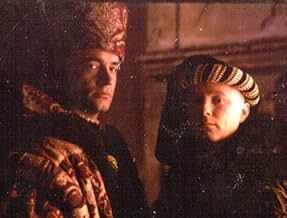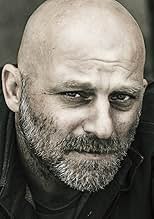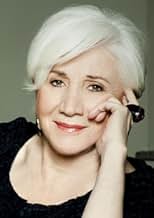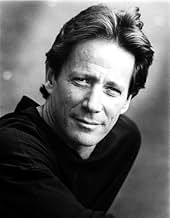IMDb RATING
6.6/10
6.5K
YOUR RATING
Spurred by divine voices and visions, fifteenth century teen Joan d'Arc leads French forces against the English.Spurred by divine voices and visions, fifteenth century teen Joan d'Arc leads French forces against the English.Spurred by divine voices and visions, fifteenth century teen Joan d'Arc leads French forces against the English.
- Won 1 Primetime Emmy
- 15 wins & 29 nominations total
Browse episodes
Featured reviews
A lot of films have been made about this person, but none of them seems to be as powerful as this one. The reason is not only the fact that few films of such topics include such a great cast (most of the characters are played by great stars of cinema). It is, I think, the way that Mr Duguay portrayed Joan of Arc, really as she most probably was like: a young, sweet maiden who dared say the British: "I will lead my nation to victory through God's help!" She turns out to be a saint rather than, like in some other movies, a religious fanatic.
The portrayal of Joan is created perfectly by a young, beautiful actress, with Polish ancestry, Leelee Sobieski. Throughout the movie, she beautifully stresses her innocence and gentleness going in pairs with the capability of leadership. In my opinion, no matter if Leelee will appear in other 50 films in her life career, this role will always be UNFORGETTABLE!
Others who shine in their roles are, of course, Peter O'Toole as bishop Cauchon. On the one hand, he judges Joan and accuses her of pride and vanity; but on the other hand, fights for her "eternal soul". Maximilian Schell also gives a fine performance as a cruel and double faced representative of inquisition. But I particularly like Peter Strauss as La Hire, a commander of the French army. This role is typical for him: someone hesitating and doubting, but in the long run, opening his eyes and totally setting his heart on the values.
"I stopped to believe in others and started to believe myself only. At Orleans, I stopped to believe myself, I started to believe in you," as he says once to Joan - REALLY POWERFUL!
The mini series about Joan of Arc is a must in my film gallery. Without hesitation, I give it 9/10. GREAT STORY, WONDERFUL CAST, EXCELLENT MUSIC, MEMORABLE QUOTES, GREAT LOCATIONS (old castles in the Czech Republic)! This movie is really visually stunning. Do see it! Having seen once, you will feel a need to see this at least for the second time.
The portrayal of Joan is created perfectly by a young, beautiful actress, with Polish ancestry, Leelee Sobieski. Throughout the movie, she beautifully stresses her innocence and gentleness going in pairs with the capability of leadership. In my opinion, no matter if Leelee will appear in other 50 films in her life career, this role will always be UNFORGETTABLE!
Others who shine in their roles are, of course, Peter O'Toole as bishop Cauchon. On the one hand, he judges Joan and accuses her of pride and vanity; but on the other hand, fights for her "eternal soul". Maximilian Schell also gives a fine performance as a cruel and double faced representative of inquisition. But I particularly like Peter Strauss as La Hire, a commander of the French army. This role is typical for him: someone hesitating and doubting, but in the long run, opening his eyes and totally setting his heart on the values.
"I stopped to believe in others and started to believe myself only. At Orleans, I stopped to believe myself, I started to believe in you," as he says once to Joan - REALLY POWERFUL!
The mini series about Joan of Arc is a must in my film gallery. Without hesitation, I give it 9/10. GREAT STORY, WONDERFUL CAST, EXCELLENT MUSIC, MEMORABLE QUOTES, GREAT LOCATIONS (old castles in the Czech Republic)! This movie is really visually stunning. Do see it! Having seen once, you will feel a need to see this at least for the second time.
Do great times call forth grand souls or do grand souls change great events or both? Joan's World - Historical Background. It was a time when the English crown controlled huge territories in France - and not by way of some invasion or occupation, but as the direct result of the fact the English King, Henry IV, (also Duke of Lancaster) and his son Henry V (both of Shakespeare fame)were descendants of the original French Duke of Normandy, William, who had conquered England in 1066 and thus the King of England continued to remain the feudal "owner" of Normandy, Brittainy and Acquitaine. This English King, Henry V would stake the biggest claim and actually force the King of France to appoint this same English King, his "lawful" successor to the French throne.
Combine this with the fact the the English had a willing French ally in the form of Charles, Duke of Burgundy who was a rival for the French crown. Its no surprise that the Burgundians were the bully boys of this era. They were allies of the English and thus their French-speaking local "enforcers." The English would control these areas for over 300 years. The "Hundred Years War" would be fought to maintain that English control.
So at the time of this story, the Dauphine of France, the weak French prince Charles was not yet the crowned King of France and controlled only a fraction of the country. Even he saw his chances for the crown as limited. Another Charles, the Duke of Burgundy, France, was far more powerful than the Dauphine and to offset his limited powers, Burgandy had allied themselves with the English.
It was into this was brutal world, that Joan of Arc was born. A savage time of "might makes right" and a nobility class-sanctioned brutalization of a citizen population caught in a titanic chess match as pawns between a class of nobles who, although they had taken ancient oaths sworn to guard the defenseless, nevertheless preyed on the very people they were sworn to defend.
There are parallels to many parts of the world where so-called "war lords" have re-imposed a modern-day feudalism of protectors and protected.
Joan was inspired, (and just by what/who, remains a hotly debated theological and psychological discussion to this day) to free France of English domination. Why? Catholics might argue that she was called to this by God in order to preserve France as a bastion of Catholicism against the invading "heresy" of the Protestant Revolution. Think how events might have turned out if England had conquered all of France and imposed Protestantism on France.
Historical Sequel to Joan of Arc.
Henry V would die in France of a fever and never assert this claim. With Joan's military successes as precedents, and the Duke of Burgandy eventually abandoning his English allies, Henry V's son, Henry VI, a weak-willed but pious monarch, would be VERY unsuccessful in asserting any of his father Henry V's claims even though another war, the "Thirty Years" war would be fought by Henry VI's dukes to try to take back lost regions. The English would eventually lose that war and surrender, city by city, castle by castle, the entire regions of Normandy and Aquitaine back to the French. Ultimately, the Ennglish would control only the port city of Calais before losing that last foothold on the Continent. A new war in England, a civil war between the houses and Dukes of York and Lancaster would be fought, in part, from the failures of the Lancastrian King, Henry VI to keep those hard-fought territories - "The War of the Roses."
Now why is the movie great? Because it faithfully captures the life of a illiterate and simple peasant girl, called by unseen forces to change the world around her in direct conflict with the brutality, the conflict, the religious zeal/fanaticism and the lust for power of he times into which Jean D'Arc was born into.
If you don't know much about either Joan or the times, you learn a great deal from this wonderful movie. Joan was on a "mission from God," at least to her way of thinking and the religious forces of her day in the form of the Church hierarchy were dumbfounded initially and enraged, eventually that some "mere girl" would dare to tell them anything about God's will for either herself, let alone her King and country.
The Maid of Orleans' life is a testament to one person, even a unschooled young girl's in an age of female political impotence to change events on a grand scale.
Combine this with the fact the the English had a willing French ally in the form of Charles, Duke of Burgundy who was a rival for the French crown. Its no surprise that the Burgundians were the bully boys of this era. They were allies of the English and thus their French-speaking local "enforcers." The English would control these areas for over 300 years. The "Hundred Years War" would be fought to maintain that English control.
So at the time of this story, the Dauphine of France, the weak French prince Charles was not yet the crowned King of France and controlled only a fraction of the country. Even he saw his chances for the crown as limited. Another Charles, the Duke of Burgundy, France, was far more powerful than the Dauphine and to offset his limited powers, Burgandy had allied themselves with the English.
It was into this was brutal world, that Joan of Arc was born. A savage time of "might makes right" and a nobility class-sanctioned brutalization of a citizen population caught in a titanic chess match as pawns between a class of nobles who, although they had taken ancient oaths sworn to guard the defenseless, nevertheless preyed on the very people they were sworn to defend.
There are parallels to many parts of the world where so-called "war lords" have re-imposed a modern-day feudalism of protectors and protected.
Joan was inspired, (and just by what/who, remains a hotly debated theological and psychological discussion to this day) to free France of English domination. Why? Catholics might argue that she was called to this by God in order to preserve France as a bastion of Catholicism against the invading "heresy" of the Protestant Revolution. Think how events might have turned out if England had conquered all of France and imposed Protestantism on France.
Historical Sequel to Joan of Arc.
Henry V would die in France of a fever and never assert this claim. With Joan's military successes as precedents, and the Duke of Burgandy eventually abandoning his English allies, Henry V's son, Henry VI, a weak-willed but pious monarch, would be VERY unsuccessful in asserting any of his father Henry V's claims even though another war, the "Thirty Years" war would be fought by Henry VI's dukes to try to take back lost regions. The English would eventually lose that war and surrender, city by city, castle by castle, the entire regions of Normandy and Aquitaine back to the French. Ultimately, the Ennglish would control only the port city of Calais before losing that last foothold on the Continent. A new war in England, a civil war between the houses and Dukes of York and Lancaster would be fought, in part, from the failures of the Lancastrian King, Henry VI to keep those hard-fought territories - "The War of the Roses."
Now why is the movie great? Because it faithfully captures the life of a illiterate and simple peasant girl, called by unseen forces to change the world around her in direct conflict with the brutality, the conflict, the religious zeal/fanaticism and the lust for power of he times into which Jean D'Arc was born into.
If you don't know much about either Joan or the times, you learn a great deal from this wonderful movie. Joan was on a "mission from God," at least to her way of thinking and the religious forces of her day in the form of the Church hierarchy were dumbfounded initially and enraged, eventually that some "mere girl" would dare to tell them anything about God's will for either herself, let alone her King and country.
The Maid of Orleans' life is a testament to one person, even a unschooled young girl's in an age of female political impotence to change events on a grand scale.
It's not often that television movies compete with big screen productions, but this one does.
Leelee Sobieski's performance is one of the best I've seen by a young actress. She really looked like someone who had seen a vision of divine power, and yet she also looked like a young girl, driven beyond her personal strength by the force of the visions. Many of the other performances were good also, but hers was so outstanding that the others paled next to hers.
The script writers took some creative license with the history. In some cases they did it for length and clarity, improving the storytelling at the expense of the history. In other cases, I didn't see how the story as written improved on the story as understood by history (although they didn't weaken the story either). But overall, the story was excellent storytelling and still good history. And since Leelee's performance was so spectacular, it was good that the script kept her on screen through most of the story.
The battle scenes show how medieval warfare was often more a matter of morale than casualties or tactics. They manage to capture the mood and chaos of battle, without the unnecessary gore that would make the movie inappropriate for children (or television). Most important, the battles feel like they're decided by the morale of the soldiers, and that those soldiers' morale depends on the presence of Joan.
This movie far outclasses almost all television movie-making. Even by the tougher standards of big screen movies, it's still an excellent movie. It makes me want to see more about the Joan of Arc story.
Leelee Sobieski's performance is one of the best I've seen by a young actress. She really looked like someone who had seen a vision of divine power, and yet she also looked like a young girl, driven beyond her personal strength by the force of the visions. Many of the other performances were good also, but hers was so outstanding that the others paled next to hers.
The script writers took some creative license with the history. In some cases they did it for length and clarity, improving the storytelling at the expense of the history. In other cases, I didn't see how the story as written improved on the story as understood by history (although they didn't weaken the story either). But overall, the story was excellent storytelling and still good history. And since Leelee's performance was so spectacular, it was good that the script kept her on screen through most of the story.
The battle scenes show how medieval warfare was often more a matter of morale than casualties or tactics. They manage to capture the mood and chaos of battle, without the unnecessary gore that would make the movie inappropriate for children (or television). Most important, the battles feel like they're decided by the morale of the soldiers, and that those soldiers' morale depends on the presence of Joan.
This movie far outclasses almost all television movie-making. Even by the tougher standards of big screen movies, it's still an excellent movie. It makes me want to see more about the Joan of Arc story.
This is great stuff. Like everyone else, I loved Leelee as Joan. She is a very good young actor. The story is well done, much better than most big budget movies (that usually end up as just dreck aimed at idiots). The acting is good, the script is great, etc, etc--what I really loved about it was the period detail. Awesome. These guys have full plate armor that makes the guys in 'Excalibur' seem underdressed! Gotta love that. If only for the battle of Orleans, this movie is worth a look. Such intensity in a battle is so rarely matched, and they did it without overexcessive gore and blood, so I can let my kids watch it without flinching (too much). This is good, because a story like this, tragic as it is, is important for everyone to hear. Not only that, the story is TRUE. I'm sure some liberties were taken in this version, but it doesn't matter, the heart of the story is about idealism in the face of bitter cynicism. Joan brings hope and victory with her vision, and for her effort is betrayed and murdered in a gruesome fashion. But she never backed down, never withdrew her convictions, and never succumbed to doubt or self pity. We should all think about that--especially in today's world of sarcasm and scorn. I'm not very religious, but this story inspires me nonetheless. And...I love midieval battle scenes with plate armor and huge swords :)
Joan is perhaps the most female difficult role to cast. The actress must be attractive but not conventionally alluring; magnetic but not intellectual; a towering figure but physically slight. You must understand why people would die for her. Above all, the performer must convey an authentic sense of religious piety, a virtual impossibility for young actors today. Sandrine Bonnaire--a wonderful star in every other respect--tried her hand in the recent French version but was too sexy for the part.
As Joan, Sobieski juggles the disparate requirements astonishingly well. This is emphatically not the kind of movie in which the actress can merely show up and look decorative; you have to work at it, but as Sobieski revealed in Uprising, she has the capacity for challenging period roles. And that also means that in contrast to her female peers in the business, she has a long professional future.
Watch out for O'Toole in an astonishing performance as a Cardinal who gradually realizes that Joan is the real thing.
The culminating scene--no details provided, you must see it yourself--is curiously uplifting and properly theological rather than merely unpleasant.
As Joan, Sobieski juggles the disparate requirements astonishingly well. This is emphatically not the kind of movie in which the actress can merely show up and look decorative; you have to work at it, but as Sobieski revealed in Uprising, she has the capacity for challenging period roles. And that also means that in contrast to her female peers in the business, she has a long professional future.
Watch out for O'Toole in an astonishing performance as a Cardinal who gradually realizes that Joan is the real thing.
The culminating scene--no details provided, you must see it yourself--is curiously uplifting and properly theological rather than merely unpleasant.
Did you know
- TriviaJoan of Arc was left-handed.
- GoofsAfter examining plague victims, Joan uses flaming alcohol to sterilize her hands. However, the existence of micro-organisms and their connection to disease was not known at that time - in fact, hand-washing did not become common medical practice until 500 years later.
- Quotes
Bishop Cauchon: Poor, deluded Joan. She has no idea she has put a monster on the throne. Those are my last words as Your Majesty's spiritual advisor.
- Alternate versionsThe DVD (180 minutes) is the complete miniseries, as it contains 40 minutes cut from the VHS, which is 140 minutes.
- ConnectionsFeatured in The 51st Annual Primetime Emmy Awards (1999)
- SoundtracksPanis Angelicus
Written by César Franck
Arranged by Julian Smith
Performed by Charlotte Church
Courtesy of Sony Music Entertainment (UK) Ltd.
- How many seasons does Joan of Arc have?Powered by Alexa
Details
Contribute to this page
Suggest an edit or add missing content








































